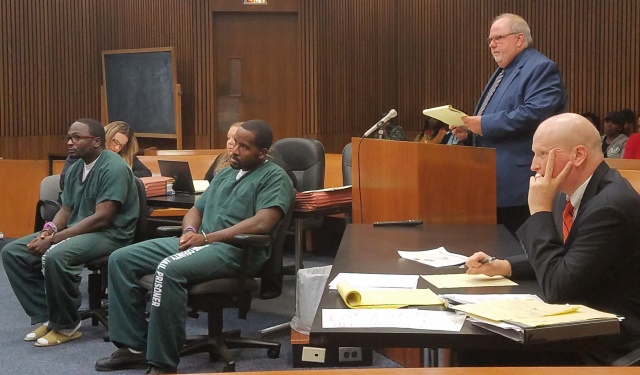
(L to r) Derrico Searcy, Darrell Ewing with defense atty. Phillip Comorski at podium, AP Jon Wojtala seated.
Third hearing Fri. Oct. 4 at 9 a.m. ordered to deal with jurisdictional questions on evidentiary hearing re: murder conviction of Darrell Ewing and Derrico Searcy
Fourth juror, foreman Brian Tubbs, testifies Sept. 6 that he has no recall of most aspects of 2010 murder trial
Judge Hathaway earlier: “What really matters is whether ONE juror, Kathleen Byrnes, was inappropriately influenced”
AP Wojtala: “The prosecution definitely plans to appeal to the Michigan Court of Appeals if a new trial is ordered;” specifies no grounds
By Diane Bukowski
September 16, 2019
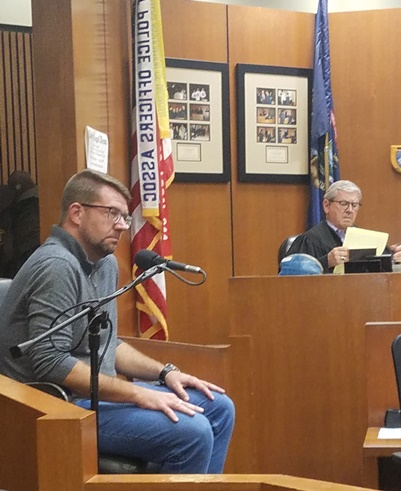
Ewing/Searcy trial jury foreman Brian Tubbs, Judge Michael Hathaway
DETROIT — Darrell Ewing, 30, and Derrico Searcy, 37, seeking to have their 2010 murder convictions overturned due to jury misconduct at their trial, and an innocence claim, will have to wait for yet another date in their ongoing evidentiary hearing. Retired Wayne County Circuit Court Judge Michael Hathaway set a fourth hearing for Friday, Oct. 4 at 9 a.m. in room 801 of the Frank Murphy Hall to deal with jurisdictional issues.
U.S. District Court Judge Denise Page Hood ordered the current evidentiary hearing in Nov. 2017.
On Sept. 6, Hathaway ordered defense attorney Phillip Comorski and AP Jon Wojtala to submit briefs with “proposed findings of fact and conclusions of law” before the Oct. 4 hearing, regarding Hathaway’s authority to order a new trial and the appropriate jurisdiction, state or federal.
Ewing and Searcy were convicted of murdering J.B. Watson Dec. 29, 2009, in an allegedly gang-related shooting at Harper and Van Dyke. They have been in prison since 2010, despite the confession of another prisoner, Tyree Washington, to the crime, backed up by affidavits from others in the car with him.
“The prosecution definitely plans to appeal to the Michigan Court of Appeals if a new trial is ordered,” Wojtala said Sept. 6. Hathaway, who appears inclined to rule in favor of the defense, said he wants to consult with Judge Hood to see if he can issue a report on his findings from the hearing and refer the case back to her for the order.
Otherwise, Ewing and Searcy will have to wait in prison through another state appellate process, and a second federal habeas hearing if the state appeals are unsuccessful, before a final determination.
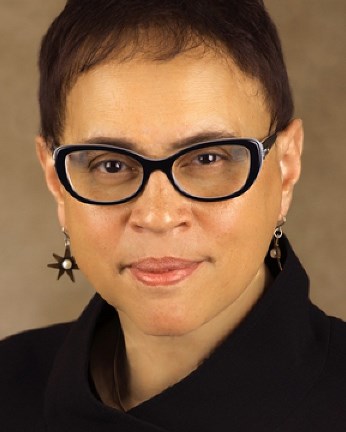
U.S. District Court Judge Denise Page Hood
Judge Hood originally ordered a new trial in November, 2017, instead of an evidentiary hearing, based on her finding of jury misconduct consisting of the independent use of Facebook and other internet research on gangs. The Sixth Circuit overturned the new trial order, with one dissenting opinion that it was in Judge Hood’s discretion to order an appropriate solution.
In Judge Hood’s order on remand, she said the trial judge should issue any order relating to a new trial.
See Judge Hood’s original order at http://voiceofdetroit.net/wp-content/uploads/Darrell-Ewing-habeas-corpus-grant.pdf/. Her order on remand is at http://voiceofdetroit.net/wp-content/uploads/EWING-v-WOODS-on-remand-to-Denise-Fort-hood.pdf.
It is not clear on what grounds the prosecution would appeal. Testimony from four original trial jurors in two sessions Aug. 26 and Sept. 6 clearly established that “extraneous information” from the internet was introduced by at least two jurors into deliberations against the trial court’s instructions. One juror strongly confirmed that research on gang “pecking orders” changed her verdict to “guilty.”
The jurors also testified that most of their time deliberating on the case was spent on defendant Ewing, with the understanding that if Ewing was guilty. so was Searcy.
Jury foreman Brian Tubbs was the only witness Sept. 6, following three other jurors who testified Aug. 26. He said that he “did not recall” information about internet research on gangs introduced by juror Karen James, Facebook research admittedly introduced by juror Michelle Chesny, or any related discussions during deliberations or trial testimony. He said he did remember sending a “hung jury” note to the trial judge but could not recall exactly why juror Kathleen Byrnes changed her vote to “guilty” afterwards.
During the Aug. 26 hearing, juror Kathleen Byrnes gave powerful, emotional testimony that the introduction of the extraneous research caused her to change her vote to “Guilty.” She had been the lone hold-out against conviction, based primarily on a confession by Tyree Washington that he committed the murder involved. But she said firmly she changed her vote after James told her that Washington was at the bottom of a gang pecking order and falsely confessed to save Ewing.
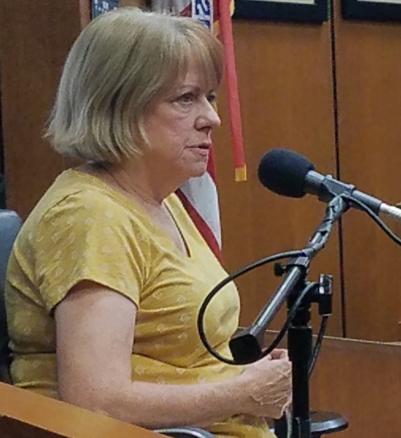
Former Juror Kathleen Byrnes
Sobbing, she said, “I remember this trial so well because it haunted me. I just kept wondering if I had done something terribly wrong.”
During that hearing, Hathaway told Wojtala after two other jurors testified, “I don’t mean to shortcut this hearing, but you can call all other 11 jurors and have them say [the internet research] didn’t matter, but what really matters is whether ONE juror, Kathleen Byrnes, was inappropriately influenced. It is irrefutable that she had some doubts that were reasonable, based on the ID evidence and the confession of Mr. Washington, and that she was worn down by other jurors bringing extraneous information into the jury process.”
Ewing’s mother LaSonya Dodson and numerous family members and supporters of both defendants have been campaigning vigorously for the duo’s release since their conviction, sponsoring protests outside the Federal Courthouse and joining various coalitions against wrongful convictions. They have packed the courtroom for both sessions Aug. 26 and Sept. 4, as well as during the original trial.
Dodson earlier told VOD she sold her house and exhausted her 401k to pay Ewing’s trial and appeals attorneys. She added that one daughter in the service retired early at the age of 26 due to severe headaches from the stress of her brother’s case, while the rest of the family ceased “living the active lives we used to.”
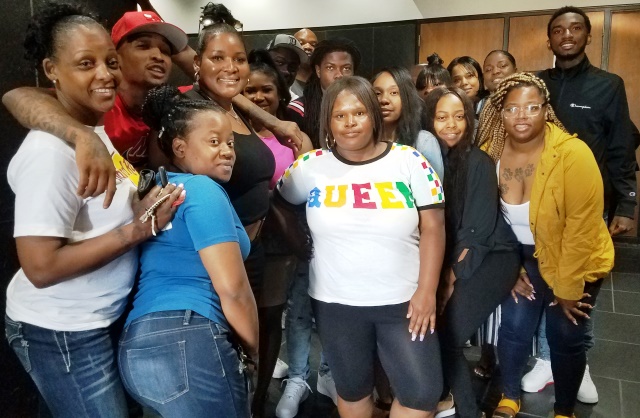
Darrell Ewing’s family and supporters including (back, 3rd from l) mother Sonya Dodson.
Related stories:
***********************************************************************************
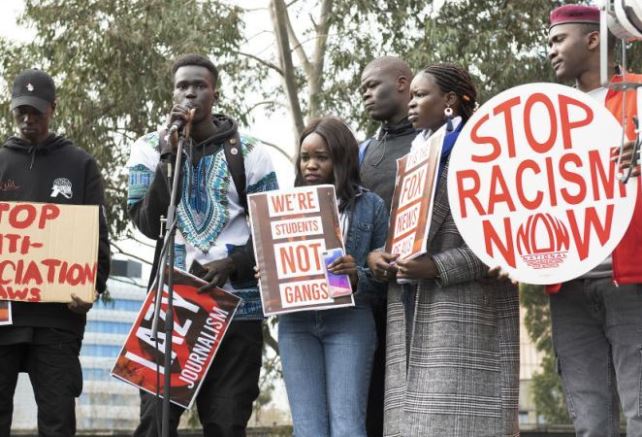
Black youth in Melbourne, Australia protest racist depictions of them in media, et. al. VOD has noted an abundance of “lazy journalism” in the U.S. as well, which reports police versions of events without further investigation.
EDITOR’S NOTE: There is also extensive internet research on the use of the term “gangs” to describe groups of youth of color for the purposes of mass incarceration. E.g. the article below:
THE BLACK CRIMINAL OTHER AS AN OBJECT OF SOCIAL CONTROL
by Patrick Williams * and Becky Clarke https://www.mdpi.com/2076-0760/7/11/234/htm
Sociology Department, Manchester Metropolitan University, Manchester M15 6LL, UK
Published: 13 November 2018
Abstract “Throughout this paper, we contend that the ‘gang’ has been appropriated by the state as an ideological device that drives the hyper-criminalisation of black, mixed, Asian, and other minority ethnic (BAME) communities. Drawing upon two research studies, we demonstrate how the gang is evoked to explain an array of contemporary ‘crime’ problems, which in turn (re)produces racialised objects to be policed. With particular reference to collective punishments, we suggest that “gang-branding” is critical to the development of guilt-producing associations that facilitate the arrest, charging, and prosecution of countless numbers of BAME people for offences they did not commit. As such, there is now an urgent need to ‘take seriously’ the criminalising intents of a dangerous criminology of the Other, which legitimises intrusive racist policing and surveillance, and justifies the imposition of deliberate harms upon racialised communities.
**********************************************************************************
 Donations for the Voice of Detroit are urgently needed to keep this paper, which is published pro bono by folks on extremely limited incomes, going. Among ongoing expenses are quarterly Lunar Pages web host charges of $350, now late, costs for court documents, internet fees, office supplies, gas, P.O. Box, etc. Please, if you can:
Donations for the Voice of Detroit are urgently needed to keep this paper, which is published pro bono by folks on extremely limited incomes, going. Among ongoing expenses are quarterly Lunar Pages web host charges of $350, now late, costs for court documents, internet fees, office supplies, gas, P.O. Box, etc. Please, if you can:
DONATE TO VOD at
https://www.gofundme.com/VOD-readers-up
************************************************************************************




